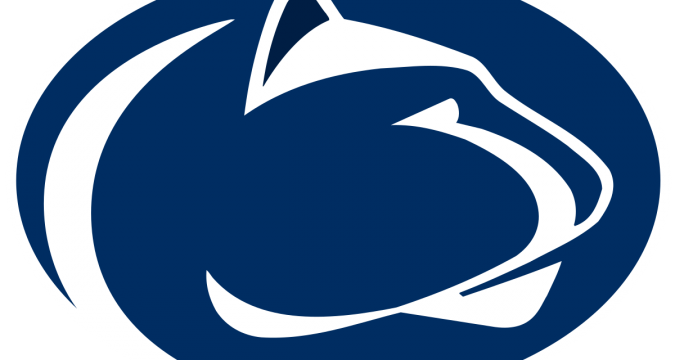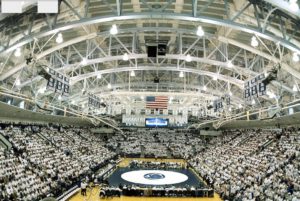
Courtesy of John Harrison
John was a three time EIWA champion and a two-time All-American at Penn State, finishing first and third in the country. While an undegraduate, he was also a member of the All-University Cabinet and president of the Undergraduate Athletic Association. Somehow he found time to work at jobs both on and off campus while a student to contribute with his wife (Patty) to the family larder. After college he coached wrestling both at the high school and collegiate level and also served as president of the NCAA Wrestling Coaches Association (1974-75), chairman of the NCAA Wrestling Sports Committee(1979-83) and EIWA president (1969).
John, tell us about your life since you graduated from Penn State?
Since leaving PSU in ’58 I’ve completed the 39 years of my major working career with retirement July 1, 1997. My first employment (’58-’64) was at Thaddeus Stevens Trade School (the school now has a new name) in Lancaster, PA. At Stevens I was wrestling coach, football trainer, and instructor in math and related drawing. I also became a high school and college wrestling referee and, in the summers, I traveled the clinic circuit to wrestling camps weekly. As a referee I worked my way up to officiating dual meets and district and regional tournaments on the high school level. At the college level, I officiated dual meets, conference tournaments (including the EIWA of which PSU was a member at the time) and NCAA and NAIA championships (including two D-I tourneys). In 1964 I was hired by Princeton University as the wrestling coach and assistant ticket manager in the athletics department. I was at Princeton for a period of 33 years, 29 years as a coach. Over that period of time, I also became ticket manager, then Business Manager of Athletics and, finally, an assistant Athletic Director with responsibilities to indoor events and facilities, team travel, the motor pool, home football contests and a few other chores. During this period of time, two friends (Clyde Witman, then wrestling coach at East Stroudsburg State College and Sam Coursen, a former ’52 Olympic team member and high school coach in New Jersey) and I purchased some property in the Poconos and we developed what was known as the “Pocono Sports Camp”. Over the years we offered several activities of which wrestling, cheerleading and women’s field hockey were our primary offerings. This 21 year enterprise was an exciting adventure and a large operation for us. It was one of total family involvement and reward. This activity bridged the gap from the end of one school year to the beginning of the next one. My career was one of thorough enjoyment, long hours and significant satisfaction. I feel fortunate to have worked for both Stevens and Princeton, as well as having been a part of private enterprise in the “off” time.
What are you doing now that you are retired?
I like physical work, travel, and play. I have a small farm; my interest in obtaining and working such developed at PSU mainly from my interactions with two teammates (Sam Minor and George Gray) and an Agricultue Deptartment professor (John Gaus) who drove us on trips (we traveled by car in those days). I also worked on a farm when in Lancaster County. Prof Gaus schooled us on the feeding qualities of steer and it stuck with me. I also do a somewhat extensive amount of traveling. I am an independent contractor with the NCAA and drug test college athletes upon call. This gets us around the USA and onto the college campuses during the academic year. I enjoy golf and seldom miss an opportunity to play. My wife, Patty, of forty plus years takes care of me and supports my habits. So, after retirement new avenues of activity continue to beckon, which combined with my current activities and interests make my life very enjoyable.
How did you get started in wrestling? What are your best memories from the years you spent as a Penn State wrestler?
My best memories of Penn State are the people- academic instructors, coaches, athletic administrators and support groups, university administrators, teammates, student friends and the towns people. This period of time was pre “Happy Valley” but, it was then, also a happy and friendly place. My entire career was impacted by lessons I learned and experienced from everyone with whom I had contact. “Doc” Speidel, the wrestling coach, and Ridge Riley, the secretary of the Alumni Association, were paramount in getting my working career on track. After graduation several instructors, both “Doc” and Ridge, as well as a local businessman at HRB, Inc., Larry Reilly, steered me straight and guided me thru the “networking” arena. To them I am most grateful.
How has wrestling changed since you were a Penn State wrestler?
Wrestling, like most sports, has changed significantly in the last 40 plus years. There are more techniques and they are more sophisticated. The variety of methods one uses to score and the scoring of points in a match has increased, the competitive parity is more widespread, weight training has entered the picture to a much greater extent, the equipment (especially the mats) is better–allowing for better maneuverability, fewer mat burns and injuries, the electronic scoreboards have enable spectators to know the score virtually instantaneously , and more wrestlers are wrestling year around in both folkstyle and international style.
John, what advice do you have for college wrestlers?
My advice to wrestlers today is to have commitment, focus, and sportsmanship. Commit to the academics and athletics when you enter each arena. Focus 100% on the task at hand in either area. And, once the battle is over, especially the competitive one, good sportsmanship is a must–win or lose. The tap dances, number one fingers in the air and negative outbursts only display inadequate and unnecessary loss of self control. An athlete is respected more for less showmanship and good sportsmanship.
Thanks John

